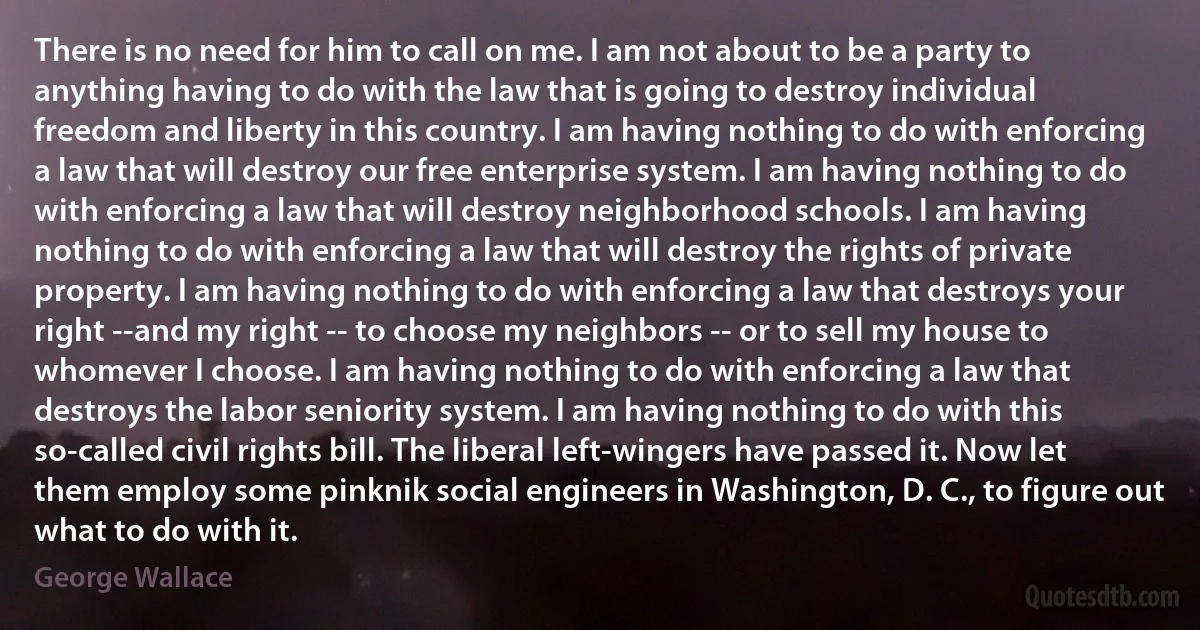
There is no need for him to call on me. I am not about to be a party to anything having to do with the law that is going to destroy individual freedom and liberty in this country. I am having nothing to do with enforcing a law that will destroy our free enterprise system. I am having nothing to do with enforcing a law that will destroy neighborhood schools. I am having nothing to do with enforcing a law that will destroy the rights of private property. I am having nothing to do with enforcing a law that destroys your right --and my right -- to choose my neighbors -- or to sell my house to whomever I choose. I am having nothing to do with enforcing a law that destroys the labor seniority system. I am having nothing to do with this so-called civil rights bill. The liberal left-wingers have passed it. Now let them employ some pinknik social engineers in Washington, D. C., to figure out what to do with it.
George WallaceRelated topics
anything call choose country employ free freedom having house labor law liberty need nothing now party property right sell seniority washingtonRelated quotes
IN a free‐enterprise, private‐property system, a corporate executive is an employe of the owners of the business. He has direct responsibility to his employers. That responsibility is to conduct the business in accordance with their desires, which generally will be to make as much money as possible while conforming to the basic rules of the society, both those embodied in law and those embodied in ethical custom. Of course, in some cases his employers may have a different objective. A group of persons might establish a corporation for an eleemosynary purpose-for example, a hospital or school. The manager of such a corporation will not have money profit as his objective but the rendering of certain services. In either case, the key point is that, in his capacity as a corporate executive, the manager is the agent of the individuals who own the corporation or establish the eleemosynary institution, and his primary responsibility is to them.

Milton Friedman
In the Cabinet there were large Irish proprietors, and, without imputing to any proprietor a desire of doing injustice to his tenants, it was easy to understand that after the long continuance of the present state of the law in Ireland, proprietors were alarmed at any proposition coming to them like the Bill of the hon. Member for Rochdale. The Irish proprietors in the Cabinet, in that House, and out of it, were afraid of a Bill that would interfere with the powers and privileges that a Parliament of landowners for generations past had been conferring upon the proprietors of the soil. That was the point. The question was, could the cats wisely and judiciously legislate for the mice? He did not believe it. He was as much opposed as any man could be to transferring the land from the landlord to the tenant; but a measure of justice was due from the former to the latter, both in Ireland and in this country as well.

John Bright
There is neither private property, beyond personal belongings, now, nor buying and selling, and therefore the occasion of nearly all the legislation formerly necessary has passed away. Formerly, society was a pyramid poised on its apex. All the gravitations of human nature were constantly tending to topple it over, and it could be maintained upright, or rather upwrong (if you will pardon the feeble witticism), by an elaborate system of constantly renewed props and buttresses and guy-ropes in the form of laws. A central Congress and forty state legislatures, turning out some twenty thousand laws a year, could not make new props fast enough to take the place of those which were constantly breaking down or becoming ineffectual through some shifting of the strain. Now society rests on its base, and is in as little need of artificial supports as the everlasting hills.

Edward Bellamy
In order better to grasp the thought of Malthus, let us translate it into philosophical propositions by stripping it of its rhetorical gloss: -
"'"Individual liberty, and property, which is its expression, are economical data; equality and solidarity are not."
"Under this system, each one by himself, each one for himself: labor, like all merchandise, is subject to fluctuation: hence the risks of the proletariat."
"Whoever has neither income nor wages has no right to demand anything of others: his misfortune falls on his own head; in the game of fortune, luck has been against him."
From the point of view of political economy these propositions are irrefutable; and Malthus, who has formulated them with such alarming exactness, is secure against all reproach. From the point of view of the conditions of social science, these same propositions are radically false, and even contradictory.

Pierre-Joseph Proudhon
What all this amounts to, then, is that the Rule of Law requires that administrative discretion in coercive action (i.e., in interfering with the person and property of the private citizen) must always be subject to review by an independent court which is not an instrument of, or even privy to, the aims of current governmental policy; that its review must in all such instances extend to the substance of the administrative act and not merely to the question whether it was infra or ultra vires; and that, if such a court finds that the rights of private citizens have been infringed, it will assess damages just as if the right of this person had been violated by another private citizen. This, in addition to the familiar requirements of generality, equality, and certainty of the law is really the crux of the matter, the decisive point on which it depends whether the Rule of Law prevails or not.

Friedrich Hayek
